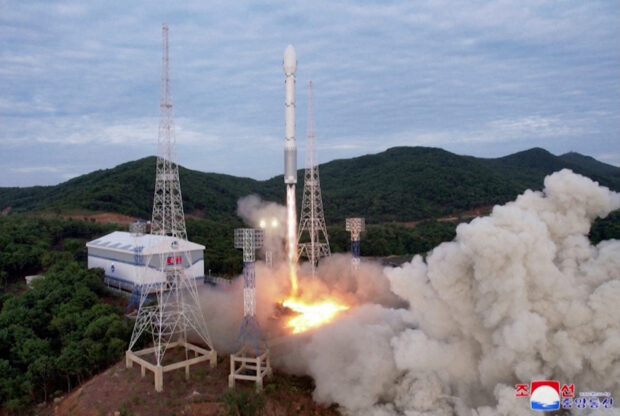Rival Koreas race to launch first spy satellites this month

A still photograph shows what appears to be North Korea’s new Chollima-1 rocket being launched in Cholsan County, North Korea, May 31, 2023 in this image released by North Korea’s Korean Central News Agency and taken from video. KCNA via REUTERS/File photo
SEOUL — Both South and North Korea aim to launch their first spy satellites into orbit by the end of the month, entering a race for military capabilities in space.
North Korea has notified Japan it plans to launch a satellite between Wednesday and Dec. 1, after two failed attempts to launch spy satellites earlier this year.
South Korea, meanwhile, plans to send its first domestically developed military reconnaissance satellite into space on Nov. 30 on a SpaceX Falcon 9 rocket launched from California’s Vandenberg Air Force Base.
Seoul plans to use SpaceX to launch four more spy satellites by 2025, and has test launched its own liquid and solid fuel rockets to launch more civilian and military satellites in the future.
A functioning reconnaissance satellite could give North Korea its first capability to remotely monitor U.S., South Korean, and Japanese troops, while South Korea’s satellites would reduce its dependence on American intelligence systems.
“Both Koreas stand to benefit to different degrees from the acquisition of independent space-based reconnaissance capabilities,” said Ankit Panda of the U.S.-based Carnegie Endowment for International Peace. “There is no doubt an element of prestige here, too, for both sides, but the practical benefits are a primary driver.”
In September Russian President Vladimir Putin gave Kim Jong Un a tour of Russia’s modern space launch facility and promised to help Pyongyang build satellites.
And on Tuesday, a researcher at North Korea’s National Aerospace Development Administration said the militarization of space by the United States and its allies demanded that Pyongyang step up its spy satellite program.
Announcing plans for South Korea’s own constellation of spy satellites in 2020, then-deputy national security adviser Kim Hyun-chong said that the South’s military needs “unblinking eyes” to monitor the Korean peninsula 24 hours a day.
The two Koreas could use such satellites for increased early warning capabilities, military targeting and damage assessments in the event of a war, and communications, among other uses, said Chun In-bum, a retired South Korean army general.
South Korean officials who recovered debris from North Korea’s recent satellite launches have cast doubt on their capabilities, and Seoul and Washington have called the launches veiled tests of ballistic missile technology banned by United Nations Security Council resolutions.
“Even if North Korea is successful in the next launch they will be a long way from any reconnaissance capability that would be of military value,” Chun said.
Panda argued that even if North Korea’s first satellite is poor in its overall resolution, it can still have some military utility for strategic warning and situational awareness.
It would be shortsighted to view the acquisition of reconnaissance capabilities by North Korea as a strictly threatening development, he added.
“While Pyongyang could use these capabilities to queue nuclear attacks and conduct damage assessment, we might also see such a capability confer a stabilizing effect by allowing North Korea to maintain better strategic situational awareness in a crisis,” Panda said.
South Korea’s capabilities are more advanced, but it still has to make more progress to see results, Chun said.
“For South Korea it will provide a meaningful boost in its surveillance capabilities but still a lot more satellites will be required,” he said.